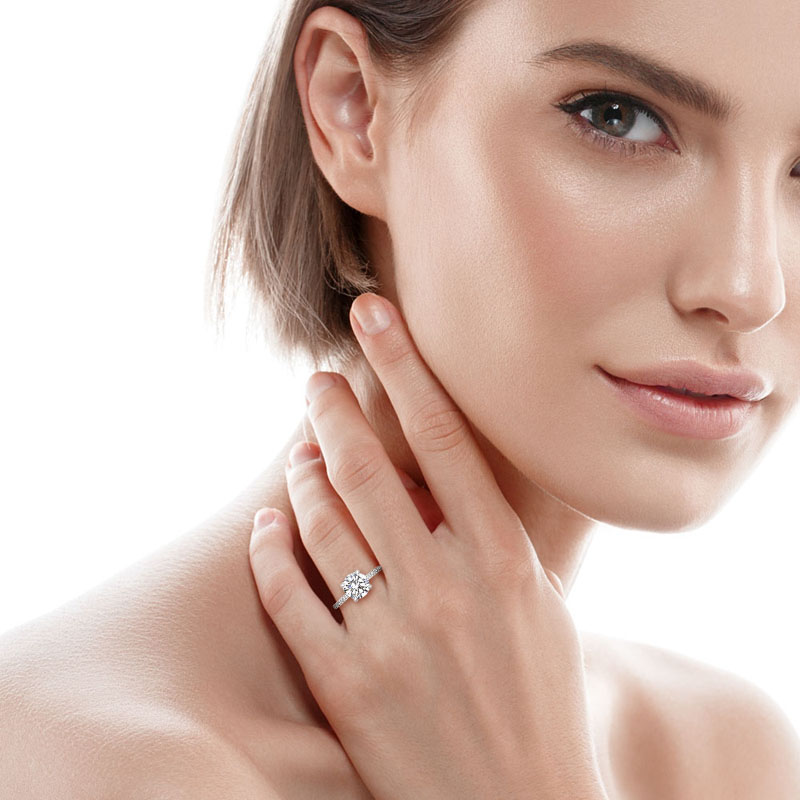
Lab-grown diamond rings have revolutionized the jewelry industry, offering a sustainable and ethical alternative to mined diamonds. One essential element of these exquisite rings is the claw setting. claws for lab grown diamond rings not only secure the stone but also elevate its beauty and brilliance. This article explores the importance of claw settings, their variations, and how they enhance lab-grown diamond rings.
Table of Contents
ToggleThe Role of Claws in Lab Grown Diamond Rings
Claws play a pivotal role in securing the diamond in place while allowing maximum light to enter the stone. For lab-grown diamond rings, claws are vital as they enhance the stone’s brilliance and make it stand out. Unlike other settings that cover more of the diamond, claw settings expose the stone, showcasing its superior clarity and sparkle.
Choosing the right claws for lab grown diamond rings ensures that the diamond remains secure and the ring maintains its timeless elegance. Each claw is meticulously crafted to hold the diamond firmly, offering a perfect balance of security and aesthetics.
Types of Claw Settings for Lab Grown Diamond Rings
Lab-grown diamond rings often feature various claw settings, each designed to enhance the diamond’s appearance. The classic four-claw setting is popular for its minimalist design, allowing the diamond to shine without obstruction. Another popular option is the six-claw setting, which provides additional security while maintaining a delicate look.
The choice of claws for lab grown diamond rings often depends on the size and shape of the stone. For instance, round diamonds pair beautifully with six-claw settings, while square or princess-cut stones often look striking with a four-claw setting. The right selection ensures the diamond’s brilliance is maximized.
Material Choices for Claws in Lab Grown Diamond Rings
The material used for claws in lab grown diamond rings greatly influences their durability and appearance. Platinum is a preferred choice due to its strength and hypoallergenic properties, ensuring the claws securely hold the diamond over time. Gold, whether yellow, white, or rose, is another popular option, offering versatility and a luxurious aesthetic.
When selecting claws for lab grown diamond rings, the material must complement the diamond’s brilliance and the wearer’s style. For instance, white gold or platinum claws enhance the icy sparkle of a lab-grown diamond, while rose gold claws add a romantic touch.
Customizing Claws for Lab Grown Diamond Rings
Customization allows buyers to tailor every aspect of their lab-grown diamond ring, including the claw setting. Jewelry designers offer various options to create unique designs, ensuring the claws reflect personal taste and style.
For lab grown diamond rings, claw customization can include adjusting the number, shape, or style of the claws. Some designs feature claw tips shaped like talons for a bold look, while others use rounded tips for a softer, classic appearance. These small details significantly impact the ring’s overall look and feel.
Maintenance of Claws in Lab Grown Diamond Rings
Proper maintenance ensures the claws for lab grown diamond rings remain secure and pristine over time. Regular inspections by a jeweler can detect signs of wear or looseness in the claws, preventing potential damage to the diamond.
Cleaning the ring at home with mild soap and water helps maintain the claws’ shine and the diamond’s brilliance. For long-lasting beauty, it’s essential to avoid harsh chemicals and physical activities that may stress the claws.
Why Claws Enhance the Appeal of Lab Grown Diamond Rings
The use of claws in lab grown diamond rings is more than a functional choice; it is an aesthetic one. Claw settings elevate the diamond, making it appear larger and more brilliant. This setting also symbolizes timeless elegance, as it has been a favorite choice for generations.
The beauty of claws for lab grown diamond rings lies in their ability to showcase the diamond’s brilliance while maintaining a secure hold. Whether for an engagement ring or a special gift, claw settings ensure the diamond remains the centerpiece of admiration.
Conclusion
Claws for lab grown diamond rings are a defining feature, combining functionality and elegance. From enhancing the diamond’s brilliance to ensuring its security, the right claw setting transforms a ring into a timeless treasure. With various customization options and material choices, claws offer endless possibilities for creating unique and stunning lab-grown diamond rings.
When choosing claws for lab grown diamond rings, consider their design, material, and maintenance needs. These elements ensure the ring remains a lasting symbol of love and sophistication, celebrating the brilliance of lab made diamonds.
